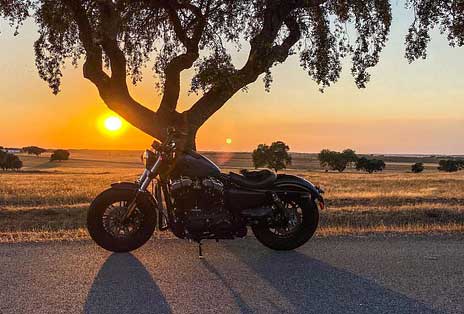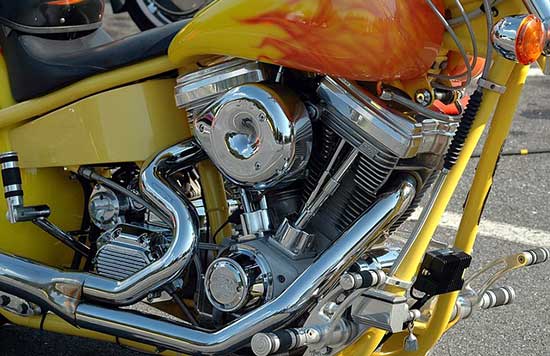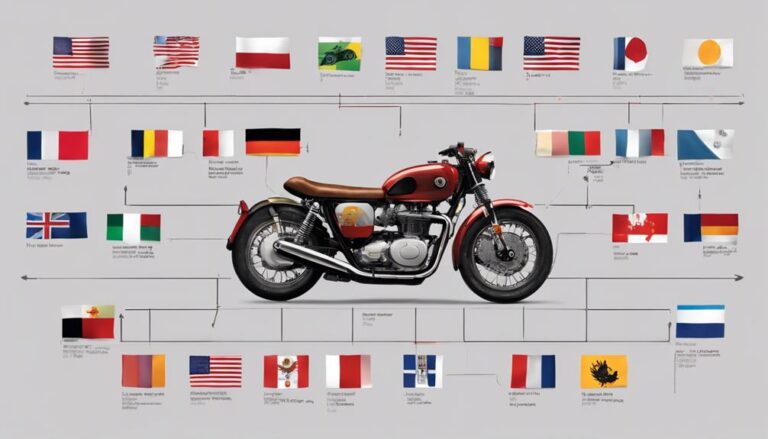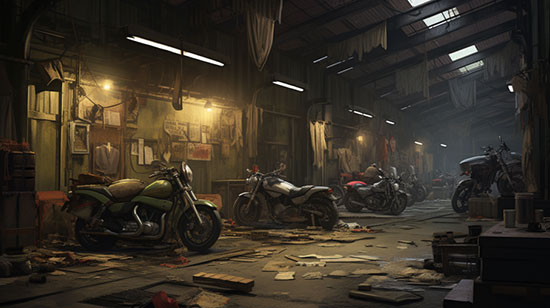You’re cruising on your bike, but that annoying chain noise is ruining your ride. It’s not just irritating, it could signal a serious issue. Don’t worry, we’ve got you covered.
We’ll explain the common causes, how to diagnose the problem, and ways to fix it. Plus, we’ll share some maintenance tips to prevent future noise.
Contents
Understanding the Role of the Motorcycle Chain
The role of the motorcycle chain is to transfer power from the engine to the rear wheel, enabling acceleration and movement. It’s an essential piece of your bike’s machinery, the vital link in your drivetrain.
When you twist the throttle, the engine revs up, generating power. This power is transferred to the transmission, which adjusts the speed and torque through gear ratios.
From there, it’s your chain’s job to deliver this power to the rear wheel. It’s a high-stress job, with the chain flexing and stretching with every shift and acceleration. If you’re hearing excessive noise during acceleration, it could indicate that your chain is worn or poorly adjusted.
It’s imperative to inspect it regularly to keep your ride smooth and safe.
Common Causes of Motorcycle Chain Noise When Accelerating
When you notice a noise from your motorcycle chain during acceleration, it’s often due to wear and tear, improper chain tension, or lubrication issues.
Over time, the chain’s components can wear down, causing a grinding or rattling noise.
If it’s not properly tensioned or lubricated, the chain may slap against the motorcycle or even skip, creating additional noise.
Chain Wear and Tear
It’s essential to regularly check your bike’s chain for any signs of wear and tear, as this can cause unwanted noise during acceleration.
Over time, chains can stretch, links can become stiff, or the chain may become misaligned. Each of these issues can contribute to an increase in noise and a decrease in bike performance.
You should be looking for specific signs that might indicate your bike’s chain is wearing out. Here’s a simple table to help:
| Sign | Possible Reason | Solution |
|---|---|---|
| Noisy chain | Chain is too tight/loose | Adjust chain tension |
| Chain skipping | Worn out chain | Replace chain |
| Chain is stiff | Lack of lubrication | Lubricate chain |
| Misaligned chain | Improper installation | Reinstall chain correctly |
Improper Chain Tension
Dealing with improper chain tension, you’re likely experiencing unnecessary noise while accelerating. This is because excessive slack or extreme tightness can cause the chain to create a rattling or grinding sound, respectively.
It’s important to remember, that a correctly tensioned chain allows for minor deflection, ensuring smooth power transfer from the engine to the rear wheel.
To adjust, locate the axle nut and chain adjusters on each side of the rear wheel. Loosen the axle nut slightly, then adjust the chain tensioners equally on both sides. Maintain an ideal chain slack of about 1.5 inches. After adjustments, ensure to tighten the axle nut securely.
Regularly check and lubricate the chain to prevent premature wear and performance issues. Remember, improper tension can significantly reduce your chain’s lifespan and overall ride quality.
Chain Lubrication Issues
You’re likely to encounter chain lubrication issues, which can cause a nasty grinding noise during acceleration if you don’t regularly maintain and lubricate your chain.
The problem isn’t just the noise; a poorly lubricated chain wears out faster and can even damage other parts. Here’s the skinny on chain lubrication:
- Lubricate regularly:
- After cleaning your chain, apply a dedicated chain lube. Don’t skimp on this – it’s what keeps everything running smoothly.
- After riding in the rain or off-road, lubricate your chain again. Water and dirt can wash away lubrication.
- Choose the right lubricant:
- Use a lubricant designed for motorcycle chains. These have additives to handle the high-speed metal-on-metal contact.
- Avoid using WD-40 as a lubricant. It’s a cleaner, not a lube, and won’t provide the protection your chain needs.
Steps to Diagnose Your Motorcycle Chain Noise
First, let’s figure out what’s making your motorcycle chain make that noise by following a few simple diagnostic steps. Start by checking the chain’s tension. Too tight or too loose, it’s bound to create noise.
Next, look for any visible damage, like broken links or worn-out rollers. If your chain’s clean, lubrication shouldn’t be the issue, but it’s worth a double-check. Remember, a dry chain can be noisy.
Now, inspect the sprocket. Worn-out teeth can cause a lot of noise. Also, confirm if your chain aligns properly with the sprockets. Misalignment generates unnecessary friction and noise.
Lastly, don’t ignore the possibility of a worn-out bearing. If none of these checks reveal the problem, you might need professional help.
How to Fix a Noisy Motorcycle Chain
Firstly, you’ll need to identify what’s causing the noise in your motorcycle chain.
Then, it’s crucial to adjust the chain tension correctly, as improper tension can be a major source of noise.
Identifying Chain Noise Cause
You’ll need to thoroughly inspect your motorcycle chain if it’s making unusual noise when accelerating. This could be a sign of several issues that need immediate attention.
- Chain Condition:
- Lubrication: If the chain isn’t properly lubricated, it can make a loud noise. Regular lubrication reduces friction and noise.
- Tension: An overly tight or loose chain can cause noise. Ensure the chain has the correct tension.
- Sprocket Condition:
- Wear and Tear: Worn-out sprockets can cause the chain to slip and make noise. Check for any visible signs of wear.
- Alignment: Misalignment between the chain and sprockets can cause noise. Make sure the sprockets are aligned correctly.
Correct Chain Tension Adjustment
Adjusting the tension of your motorcycle chain properly is crucial for reducing noise when accelerating. Finding the sweet spot, neither too tight nor too loose, is essential. Over-tightening the chain can lead to excessive wear on the chain and sprockets.
On the other hand, a chain that is too loose can jump off the sprockets, resulting in damage or even a dangerous accident.
To begin adjusting the tension, place your bike on its stand, making sure it is level. Then, using a ruler or tape measure, check the slack halfway between the sprockets. Refer to your owner’s manual to determine the ideal tension.
If the tension is off, you will need to loosen your rear axle nut and adjust the chain adjusters on either side of the wheel.
It is important to make equal adjustments on both sides to ensure the wheel remains aligned. After making the necessary adjustments, tighten the axle nut securely.
Lubrication for Noise Reduction
After you’ve adjusted the tension, applying the right lubricant can further reduce chain noise and prolong the life of your motorcycle’s chain. It’s not just about slapping on any old grease, though. The type and method of application you choose are key.
- Select a lubricant specifically designed for motorcycle chains
- This ensures compatibility with the chain’s materials
- It’s often formulated to resist fling-off at high speeds
- Apply it properly
- Clean the chain first to remove grit and old lubricant
- Apply the lubricant evenly along the inner side of the chain while rotating the wheel slowly
Maintenance Tips to Prevent Chain Noise
By regularly cleaning and lubricating your bike’s chain, you’re less likely to experience chain noise. Over time, dust and grime can build up on the chain, causing it to wear out and create noise when you accelerate. Proper maintenance is the key to a quiet and smooth ride.
Here are some tips to keep in mind:
| Maintenance Tips | Benefit |
|---|---|
| Regular cleaning | Removes dirt and grime |
| Lubrication | Reduces friction |
| Checking chain tension | Prevents overstretching |
| Replacing worn-out parts | Ensures optimal performance |
| Regular inspection | Detects issues early |
Your motorcycle’s performance largely depends on how well you maintain it. Don’t ignore the small signs like chain noise; they’re often an indication of bigger underlying issues. Remember, a well-maintained bike not only rides better but also lasts longer.
When to Seek Professional Help for Motorcycle Chain Noise
If you’ve tried all the maintenance tips and still hear a persistent chain noise, it’s time to seek professional help. Motorcycle mechanics have the expertise to diagnose and fix the issue, be it a worn-out chain, damaged sprockets, or incorrect tension.
Here’s what you can expect when you take your bike to a professional:
- Diagnosis
- They’ll examine the chain and sprockets for wear and tear.
- They’ll check the chain tension and alignment.
- Solution
- They might recommend a chain replacement if it’s excessively worn or damaged.
- If the sprockets are worn out, they’ll be replaced too.
Don’t ignore chain noise. It’s not just annoying, it can lead to more serious problems, compromising your safety on the road.
Conclusion
Caring for your motorcycle’s chain is crucial to ensure a smooth ride. Noise when accelerating often indicates a chain problem. By understanding its role, identifying potential issues, and knowing how to fix them, you can maintain optimal performance.
Regular maintenance is key to preventing chain noise. If troubles persist, seek professional help. Master your motorcycle’s mechanics for a journey free from the disruptive sounds of a problematic chain.






